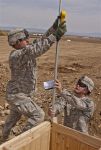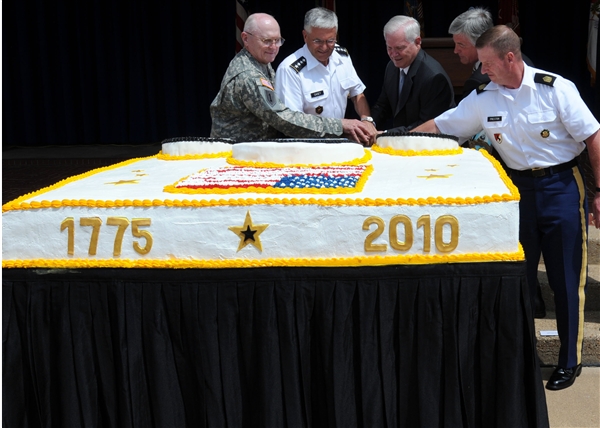FORWARD OPERATING BASE SHARANA, Afghanistan — When 30,000 U.S. troops surged to Afghanistan, space for them to live, work and store equipment became a critical need.
This base in Afghanistan’s Paktika province is meeting that need with the help of the 243rd Engineer Detachment Construction Management Team from the 18th Engineer Brigade based in Heidelberg, Germany.
Army Maj. Aaron Wolf leads the team, which has been here for three months. Before the surge, the base was a third the size it is now, he said.
“Everything after the surge has been constructed,” Wolf said. “It’s a massive engineering effort, in facilities that have been built along with those we’re still building.”
Living space for troops was the first priority, Wolf said, and four tent villages have been added to the base. The villages are made up of Air Force “Harvest Falcon” tents, including floored, heated and cooled sleeping tents and latrine and shower facilities, he added.
“Other things that have been programmed include larger facilities to hold supplies and ammunition, and the new Soldier Center West that we’re building,” he said. The soldier center complex will include a chapel, a large gym, a post exchange, a coffee shop, a barber shop and a legal center with offices for other functions such as equal opportunity, Wolf said.
“It’s geared to facilities for the soldiers themselves,” he said, noting the complex also will house a morale, welfare and recreation building large enough to hold a phone and computer center where troops can talk to their families, as well as pool and pingpong tables and conversational-seating areas.
Wolf’s team plans and oversees construction, he said, while building on base is accomplished through three means: troop labor, local labor and LOGCAP, the Logistics Civil Augmentation Program that provides contracted contingency support to the Army.
The soldier center employs all three, Wolf said, adding that he hopes the complex will be complete in three to four months. “Troop labor depends on what’s available, and [with] local national labor, it’s sometimes difficult to get them onto the base to build,” Wolf said. Local workers also sometimes have internal supply issues and religious holidays that can make scheduling a challenge, he said.
“It’s very unpredictable,” Wolf acknowledged. “If we were back in the states, we’d have a contractor and we’d have everything laid out, and the contractor would meet all those milestones. We’d have great confidence in saying we would be done on a certain date. It’s a little different here.”
The other main construction effort is a C‑17 landing strip, Wolf said, although smaller projects, including canine team kennels and a power plant, also are under way. A quarter of the way into their yearlong deployment, Wolf said, his team is comfortable with the particular challenges of doing their job in Paktika province.
The team includes nine Army engineers, a civilian acquisition analyst, and seven civilian inspectors, draftsmen and engineers, each of whom has more than 20 years of experience in the field, Wolf said.
“We all know what our job is, but until we get on the ground and understand what the environment is, … we really don’t understand all those little things that will make the job better,” he said.
Much of the team’s primary effort involves working with local laborers, Wolf said. “Some of the local national contractors are very good at construction, and they’ve got great foremen,” Wolf said. “Others are not so good, and that’s a challenge for my guys to … provide some mentorship.”
Army Capt. Justin McMillan is the master planner for the team, and he is working to program the passenger terminal, fire station and other facilities for the landing strip. Programming involves planning “the placement of structures, their build-outs, power and utility requirements,” he explained.
Wolf noted contracted U.S. workers complete the power and utility work and most of the finishing work.
Army Sgt. Maj. James G. Scullion, the team’s senior enlisted advisor and operations sergeant major, said the deployment has been a learning experience for the detachment’s junior members. Scullion said three team members — a second lieutenant, a specialist and a private first class — are all on their first deployment and have been in the Army for about a year.
“These young soldiers came here with no ‘hands-on’ experience,” he said. “I believe they now understand how to apply the skills they were taught in the school environment to real-world missions.”
Scullion said the team’s work with Afghan contractors is a unique opportunity.
“The team gets to provide them technical advice and perhaps better ways of doing certain construction tasks, as well as learning from them,” the sergeant major said. “In return, we get quality construction for all the soldiers to benefit from, … from force protection to facilities that allow them time to relax and unwind.”
Source:
U.S. Department of Defense
Office of the Assistant Secretary of Defense (Public Affairs)

 von
von 
